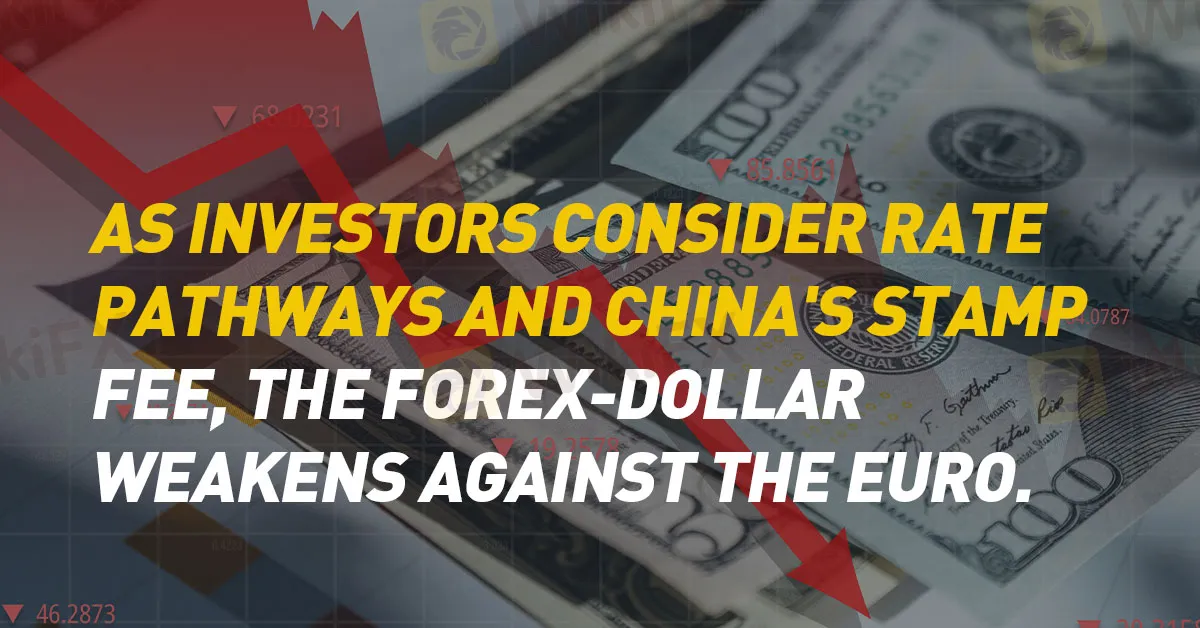简体中文
繁體中文
English
Pусский
日本語
ภาษาไทย
Tiếng Việt
Bahasa Indonesia
Español
हिन्दी
Filippiiniläinen
Français
Deutsch
Português
Türkçe
한국어
العربية
AS INVESTORS CONSIDER RATE PATHWAYS AND CHINA'S STAMP FEE
Abstract:After Federal Reserve Chair Jerome Powell hinted at the likelihood on Monday, the dollar fell off a 12-week high, while the China-sensitive euro crept higher as a result of Beijing lowering its stamp fee on stock trading.

After Federal Reserve Chair Jerome Powell hinted at the likelihood on Monday, the dollar fell off a 12-week high, while the China-sensitive euro crept higher as a result of Beijing lowering its stamp fee on stock trading.
The dollar index =USD, which compares the value of the dollar to those of six other currencies, dropped 0.06% to 104.11 on Saturday after reaching its highest level since early June on Friday. The index is poised to end a two-month losing trend with a gain of more than 2% in August.
In a much-anticipated speech at the annual Jackson Hole Economic Policy Symposium, Powell committed on concerns from the unexpected strength of the U.S. economy as well as progress achieved on lowering price pressures.
According to the CME FedWatch tool, markets see an 80% chance of the Fed maintaining its current policy next month, but a 25-basis point raise in November is now more likely than it was a week ago: 51% as opposed to 33%.
According to Chris Weston, head of research at Pepperstone, It's still doubtful that the Fed would raise interest rates in September. But November is looking to be a change expectation for interest rates.
The Fed possibly starting up again in November is helping the dollar, according to Weston, at a time when many other G10 central banks have already priced in an extended pause.
A string of positive U.S. economic data releases about a recession, but some investors are concerned that the Fed will maintain high interest rates for a longer period of time given that inflation is still above.
Investors will be paying close attention to statistics on payrolls, core inflation, and consumer spending this week because the Fed has stressed the forthcoming U.S. economic data.
Further tightening could be anticipated, according to Rodrigo Catril, senior currency strategist at National Australia Bank, if the data doesn't cooperate.
WORLD SUMMER
In other news, the euro, which has lost 1.7% of its value so far in August, increased by 0.14% to $1.0809 after China cut the stamp fee on stock trading in an effort to revive the faltering market in the second-largest economy in the world.
However, the euro was close to an almost 11-week low after European Central Bank President Christine Lagarde emphasized the necessity for restrictive policies.
There is now a tie in the market over whether the 3.75% rate will increase again in September.
As a result of the Chinese central bank consistently issuing stronger-than-expected daily midpoints, the value of the Chinese yuan against the dollar has stabilized. At 7.2932 per dollar, the spot yuan CNY=CFXS.
Australia's sensitive to China currency, the AUD=D3, increased by 0.1% to $0.6408 after falling earlier this month as concerns over China's sluggish post-pandemic recovery impacted on mood.
According to Tommy Wu, senior economist at Commerzbank, “market confidence will probably not increase much until there are signs of China's weakening economic momentum turning around.”
The yen JPY=EBS decreased by 0.02% to 146.48 per dollar, slightly above the nearly nine-month low of 146.64 reached on Friday. Traders are still on the lookout; the Japanese government may be intervening in the currency market.
As underlying inflation in Japan continues to be “a bit below” its objective, the Bank of Japan will retain its present ultra-easy policy, the central bank's governor said on Saturday.

Disclaimer:
The views in this article only represent the author's personal views, and do not constitute investment advice on this platform. This platform does not guarantee the accuracy, completeness and timeliness of the information in the article, and will not be liable for any loss caused by the use of or reliance on the information in the article.
Read more

SEC Warns of Love Scams and Pig Butchering Investment Schemes
SEC's new campaign warns about relationship investment scams, highlighting red flags, losses, and protective measures. Stay safe from "pig butchering" schemes.

WeTrade Secures CySEC License to Expand EU Trading Services
WeTrade secures a CySEC license, allowing EU-wide operations. The approval boosts services, partnerships, and trust across the global trading community.

Beware of Gold Bar Investment Scams: Rising Threats
Gold bar scams surge in 2025 as gold prices hit $3,000/oz, targeting seniors. Learn how scammers exploit trust in gold and tips to avoid these frauds.

"Rate & Reward: Broker Review Contest"
Share Your Real Experience, Rate Your Broker Duration: April 21, 2025 – May 23, 2025 Eligibility: Must be a verified account holder of the reviewed broker.
WikiFX Broker
Latest News
eXch Exchange to Shut Down on May 1 Following Laundering Allegations
How a Viral TikTok Scam Cost a Retiree Over RM300,000
JT Capital Markets Review
FCA Proposes Simplifying Investment Cost Disclosure for Retail Investors
Fresh Look, Same Trust – INGOT Brokers Rebrands its Website
Beware of Gold Bar Investment Scams: Rising Threats
SEC Warns of Love Scams and Pig Butchering Investment Schemes
Finalto Teams Up with Alphaville for 2025 London Quiz
Elites Gather in Taipei to Forge a New Forex Ecosystem
WeTrade Secures CySEC License to Expand EU Trading Services
Currency Calculator


